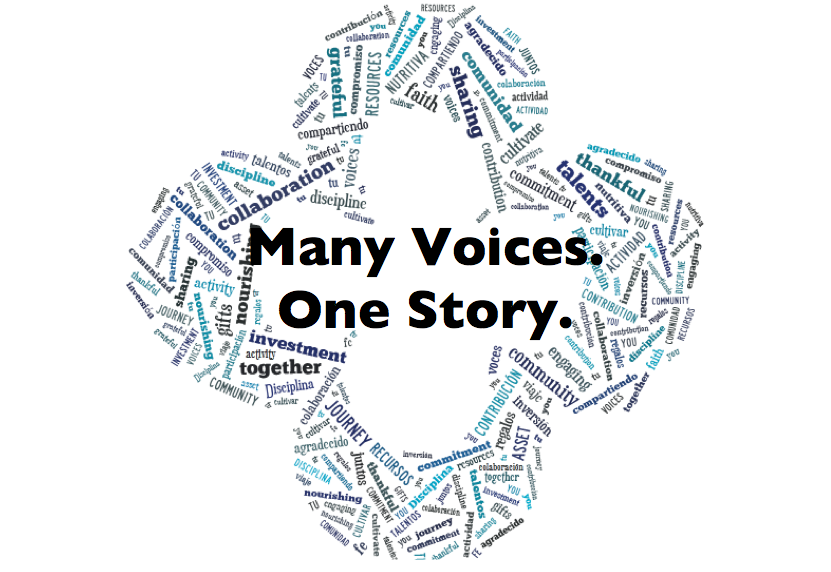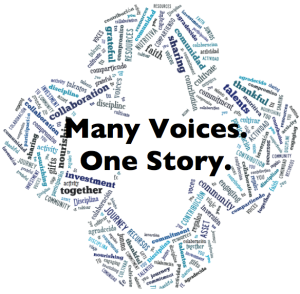
Sunday, October 27, 2013
Twenty-Third Sunday after Pentecost
Luke 18:9-14
Rev. Dr. Amy Butler
Sermon Audio
_____________________________
Some of you have heard me mention Arch books before. Arch books are children’s books that tell bible stories, and their regular reading—first by grown-ups in my life and then on my own—were, though I didn’t know it then, the foundation of my ability to breeze through the required Introduction to the New Testament course in college.
Among my favorite Arch books is the book that tells the story of today’s parable from the gospel of Luke. The main reason it was a favorite was because whenever my Dad would read this particular Arch book he’d go out of his way to act out the character of the Pharisee. He’d turn his nose up in a haughty way and adopt a very self important tone while he read, “God, I thank you that I am not like the other people: thieves, rogues, adulterers, or even like this tax collector!”
 I didn’t really know what this meant, except that it was bad to be a thief, rogue, adulterer, tax collector, or any combination thereof. This always worried me a bit because I knew at the very least that I was a thief, given the roll of multi-flavored lifesavers I shoplifted from the rack in the grocery store checkout line at age 5, snuck home, and hid in the coat closet of my Grandma’s house, gaining no joy whatsoever in the days that followed when I would sneak into the closet, hide under the mothball-scented winter coats, and try desperately to eat the evidence of my crime before my mother found out. I never was really sure if I was a rogue or an adulterer, given the fact that I had no idea what those were. As for tax collector, I knew I wasn’t one of those, but based on what I’d heard about taxes, I knew it couldn’t be good.
I didn’t really know what this meant, except that it was bad to be a thief, rogue, adulterer, tax collector, or any combination thereof. This always worried me a bit because I knew at the very least that I was a thief, given the roll of multi-flavored lifesavers I shoplifted from the rack in the grocery store checkout line at age 5, snuck home, and hid in the coat closet of my Grandma’s house, gaining no joy whatsoever in the days that followed when I would sneak into the closet, hide under the mothball-scented winter coats, and try desperately to eat the evidence of my crime before my mother found out. I never was really sure if I was a rogue or an adulterer, given the fact that I had no idea what those were. As for tax collector, I knew I wasn’t one of those, but based on what I’d heard about taxes, I knew it couldn’t be good.
So hearing my Dad read that Arch book, in addition to being entertained at his weird Pharisee impression, also made me feel guilty about those Lifesavers yet again, relieved that I didn’t have any connection to tax collecting as far as I knew, and sure that this story means you shouldn’t brag about how good you are in public.
In Luke’s gospel this parable is told along with others, many of which we’ve read over the last few weeks, and it’s told to the disciples in Jesus’ inner circle…along with the crowds that were increasingly following Jesus as his fame was growing.
Everybody listening to the story would have known, of course, that the two characters in this parable existed on far opposite ends of the social strata of the day. The Pharisee was a respectable, practicing Jew—probably the equivalent of what we’d call a “church nerd” around here. The crowd would have known that the Pharisee made a serious point of practicing his faith, possibly even more rigorously than your average religious Jew.
The tax collector couldn’t have been more different than the Pharisee. Collecting taxes was a profession forbidden to Jews; anybody who was a tax collector was ritually unclean. Plus, everybody would have hated that tax collector because tax collectors made their own salaries by upping the already crippling taxes required by the Temple and the Roman government.
So, starting with these cultural definitions, the parable unfolds. The Pharisee (and, I am still hearing my Dad’s voice here) stands up in front of the temple where everyone can see him, all by himself, and proceeds to thank God that he’s not like all those bad people and, in fact, that he does all this good and holy stuff like giving a lot of money and fasting often. He’s really braggy about it, too. I mean, it’s not even a humble brag, a new term I learned from my teenagers this week and which Urban Dictionary defines as: “Subtly letting others know about how fantastic your life is while undercutting it with a bit of self-effacing humor or ‘woe is me’ gloss. As in: Ugh, I just ate about fifteen pieces of chocolate. Gotta learn to control myself when flying first class or they’ll cancel my modeling contract.”
No, the Pharisee was pretty much just straight up bragging.
Meanwhile, far away from the temple is the tax collector, out of the view of folks passing by. He seems to be in real distress, very aware of his own failings and beating his chest as he asks God for help. He prays a prayer many of us will find familiar, as it’s standard Christian liturgy for confession: “Lord have mercy on me, a sinner.
The parable seems to want to teach us what I thought it meant every time I heard that Arch book: don’t be proud. It doesn’t matter how much you give or how holy you are; you’re better off just being humble.
Well, this is all fine and good, and I think it’s probably a good lesson to remember to be humble. But, first of all, Jesus’ parables are generally never as straightforward as they appear—there’s always a hook in there somewhere. And, secondly today is Stewardship Sunday, the Sunday that we all formally make our commitments of time and money for the year ahead—so (a desperate preacher might pray in the week leading up to a Sunday like this): surely, Jesus, you can’t be telling us that it’s okay not to give money or practice our faith as long as we’re humble and say sorry?!?
So, yes. Per usual, I think Jesus is trying to say something a bit deeper than just, “don’t brag about all the good stuff you do.” It’s not like the Pharisee is horrible and the tax collector is great, because there are good and bad things going on with both of these men: the Pharisee, while arrogant, is practicing his faith and the tax collector, while a dishonest jerk, is recognizing his own need for forgiveness. And you and I can find ourselves in both of those expressions.
Perhaps the distinction Jesus is trying to draw here is, rather, that the Pharisee seems to be focused on his own efforts on behalf of God; he uses first person singular pronouns throughout his whole prayer, seeming to indicate independence and sole sufficiency. While the tax collector, on the other hand, seems very aware of what God has done for him, and his prayer is a prayer for the exact opposite of independence: he knows he needs help. Many gifts, many needs—we are not one or the other; all of us have both.
This is the story we hear in Luke today: that the life of faith is not a life of individuality or isolation. We need God, and we need each other: to find healing in our own lives, and to do God’s work of healing this broken world.
In a few moments we’ll be collecting the offering and collecting pledge cards symbolizing our commitments of time and money for the year ahead here at Calvary. If you’ve already turned one in—either online or in person—it’s okay to put a card in the offering plate to symbolize your participation. And for those of you who have not yet completed your pledge card, you have an opportunity now to do that and to participate in the stewardship of your lives and of this community in the year ahead.
It turns out the lesson to be learned from the Pharisee and the tax collector is not a lesson about bragging. It’s a lesson about admitting that we need God and we need each other, and then turning that necessary dependence into a force that can change the world. Acknowledgement of both of those, I think, are at the heart of good stewardship. Stewardship of our whole lives—what we have and who we are—is our grateful acknowledgement that we are all connected, to each other and to God. And that connection is a holy gift we are called to tend carefully and intentionally.
A few weeks ago I had the opportunity to attend the 40th anniversary celebration for the Children’s Defense Fund. As CDF is an organization deeply steeped in faith, there was a prayer as part of the program. One of the nuns from the “Nuns on the Bus” got up and led us through a tactile prayer; I want to share it with you today. Please join me.
First, hold out your right hand. In this hand, imagine you are holding all the many gifts you have to offer the world. This hand is overflowing with your talents—all the special ways in which you contribute to your community. These include your considerable professional skills, your intellect, your artistic gifts, your training and education. This hand also holds your vocation, your compassion, your calling—the things about which you are passionate, the ways in which you feel called and compelled to help those who need help. This hand holds your material resources, all the money and things that you have earned, that you have been given—so, so much in comparison to the rest of the world. This hand holds your time, your intention, your commitment, your resolve, your influence. Feel for a moment of silence the weight of all you have to offer the world, so much you can’t even hold it all.
And now hold out your left hand. Here in this hand is all the desperate need in this world. Children who are hungry; violence tearing countries apart; corruption devastating the most vulnerable. Deep inequities, broken relationships, pain-filled situations. There’s sadness in this hand, and grief—your own and the whole world’s. Fear and uncertainty, hopelessness and desperation. There’s so much pain and brokenness and want that sitting here trying to hold it all seems just overwhelming.
Now reach out to the person next to you. Join your right hand, the hand that holds so many resources and gifts, to your neighbor’s left hand, holding heavy burdens of this broken world. Imagine the ways in which our individual gifts and convictions and join together to tell one story, the story of God’s great love for this world. And hang on tight, because praying prayers all alone will only get us so far. Understanding that we need God and we need each other, can change the world.
So hear now this blessing: May God give us the grace never to sell ourselves short; the grace to risk something big for something good; the grace to remember that the world is too dangerous for anything but truth and too small for anything but love; the grace to recognize that together we can heal and be healed by God’s transforming power.* Amen.
*Modified from Credo, by William Sloane Coffin
